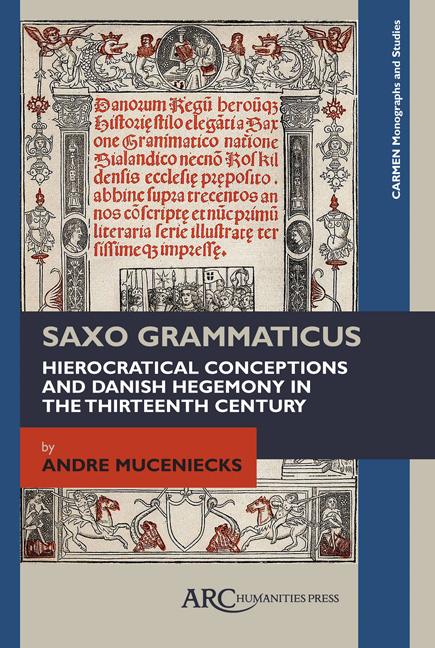Book contents
- Frontmatter
- Contents
- List of Illustrations
- Acknowledgements
- Foreword
- Preface
- Chapter 1 Denmark and the Baltic in the Thirteenth Century
- Chapter 2 The Work
- Chapter 3 Political Conceptions
- Chapter 4 Euhemerism and the East in Saxo Grammaticus
- Chapter 5 Virtues and Values in Saxo Grammaticus: The Four Cardinal Virtues
- Chapter 6 The Thematic of the Counsellor
- Conclusion
- Appendix 1 List of the Kings in Books I–VIII of the Gesta Danorum
- Appendix 2 Rulers and Archbishops of Denmark in Relation to Events in the Baltic, the Empire, and the Papacy
- Appendix 3 Genealogy of the Valdemarian Kings
- Bibliography
- Index of Persons
- Index of Places and Peoples
- Index of Authors and Primary Sources
- Index of Subjects
Chapter 4 - Euhemerism and the East in Saxo Grammaticus
Published online by Cambridge University Press: 15 January 2021
- Frontmatter
- Contents
- List of Illustrations
- Acknowledgements
- Foreword
- Preface
- Chapter 1 Denmark and the Baltic in the Thirteenth Century
- Chapter 2 The Work
- Chapter 3 Political Conceptions
- Chapter 4 Euhemerism and the East in Saxo Grammaticus
- Chapter 5 Virtues and Values in Saxo Grammaticus: The Four Cardinal Virtues
- Chapter 6 The Thematic of the Counsellor
- Conclusion
- Appendix 1 List of the Kings in Books I–VIII of the Gesta Danorum
- Appendix 2 Rulers and Archbishops of Denmark in Relation to Events in the Baltic, the Empire, and the Papacy
- Appendix 3 Genealogy of the Valdemarian Kings
- Bibliography
- Index of Persons
- Index of Places and Peoples
- Index of Authors and Primary Sources
- Index of Subjects
Summary
EUHEMERISM WOULD BE understood as a hermeneutical method developed since Hellenism, whereby gods were men whose deeds were amplified by the passage of time and the development of mythical tradition. Its name was given in homage to the Hellenic Euhemeros who first used the method in the third century, although there were many later Greek authors who used similar hermeneutics, such as Herodotus.
Euhemerism proper or similar interpretations would be recognized in the works of authors and historians from very different backgrounds, from Antiquity to the Middle Ages, such as Clement of Alexandria, Isidore of Seville, and Roger Bacon. The method would be defined alternatively as a historical or historicizing interpretation of mythology.
In medieval Scandinavia, euhemerism was a method well known to authors with historical pretensions such as Snorri Sturlusson and Saxo Grammaticus. One of the most refined elaborations following these patterns was made by the author of Heimskringla who, as discussed before, although identified frequently as Snorri Sturlusson, might have been someone else.
A refined Scandinavian euhemeristic construction also may be found in the Prologue of the Prose Edda, a creation most certainly by Snorri Sturlusson, whose attribution of authorship is made in one of the manuscripts, although a number of additions probably were made by other scholars, mostly in the prologue. In all of these texts there are coherent scholarly elaborations, intending to connect genealogically the ancient Scandinavian gods to the kings of the twelfth and thirteenth centuries. Pagan gods are described as notable men of Antiquity, heroes and kings who achieved fame in the North due to their excellent virtues and characteristics.
There are three main schools of interpretation of these texts. The historical/historicizing school, whose first proponents were the Danish archaeologist Karl Petersen (1849–1896) and the Swedish Bernhard Salin (1861–1931), was largely accepted by the subsequent Germanists and defended the narratives of Snorri as reflecting the memory of actual events of the Germanic past, such as the migra tions that occurred since the fourth century from the areas of the Don and the Black Sea heading to Scandinavia through Germania.
- Type
- Chapter
- Information
- Saxo GrammaticusHierocratical Conceptions and Danish Hegemony in the Thirteenth Century, pp. 53 - 66Publisher: Amsterdam University PressPrint publication year: 2017



